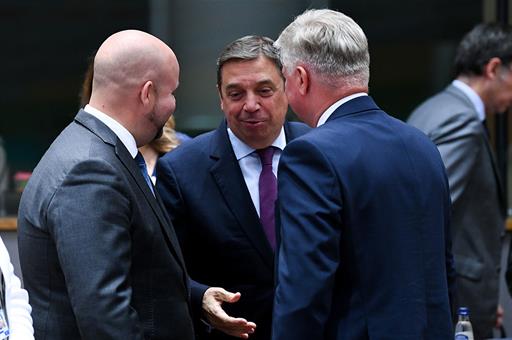Planas: "The European Commission must support the agricultural sector in the face of drought and mobilise the agricultural reserve as soon as possible"
News - 2023.5.30
The minister considers that "we are facing a climate crisis, with direct effects on the markets" and pointed out that "the European Commission must take a step forward and mobilise the agricultural reserve of the Common Agricultural Policy (CAP) as soon as possible".
Today in Brussels, Luis Planas attended the Council of Agriculture and Fisheries Ministers of the European Union, which discussed a document presented by the Portuguese delegation, with the support of Spain, France and Italy, on climatic adversities in several European countries in the water year 2022/2023. In recent weeks, Minister Planas has had bilateral contacts with different Member States to coordinate views ahead of today's debate in the Council.
In his speech, the minister valued the timeliness of this debate, given the critical situation caused by an intense drought that is compromising the viability of crops and pastures. Planas explained that Spain has already adopted a package of urgent measures to alleviate the difficulties of farmers and stockbreeders. These include 636 million euros in direct aid, of which 355 million euros is earmarked for livestock farmers, 276.7 million euros for farmers and 5 million euros for beekeepers.
He recalled that cumulative rainfall during the water year, which starts on 1 October, is almost 30% lower than in the same period of the previous year, which was already extremely dry, with a 26% reduction compared to average values.
The winter cereal harvest will be historically low in Spain and straw and fodder, essential for animal feed, are in short supply. In addition, the lack of water will lead to a reduction in different types of production, which will affect the markets, which is why he has urged the Commission to take measures at EU level, in view of a problem that affects several Member States.
He also indicated that Spain asked the Commission last April to adopt urgent measures, in addition to national measures, such as the mobilisation of the crisis reserve, the possibility of using EAFRD rural development funds, increasing the percentage of the advance payment of Common Agricultural Policy (CAP) aid and providing greater flexibility around direct payments.
Market situation
The Council of Ministers also reviewed the situation of agricultural markets, which are in a difficult situation as a result of the drought and the effects of the Russian invasion of Ukraine, although energy and commodity prices are now lower than they were twelve months ago, with the exception of rice and sugar.
During the Council, Planas had the opportunity to personally greet the Ukrainian Minister of Agrarian Policy and Food, Mykola Solskyi, in Brussels, after having held a bilateral meeting last week by videoconference.
The minister reiterated Spain's support and understanding for the complicated situation in the countries bordering the war zone, but stressed that the response to the crisis must be European and, therefore, there is no room for unilateral decisions. In this regard, the minister specified that Spain has sent a letter to the Commission, together with 12 other Member States, in which it demands that any measures taken on this issue "be based on transparency and the use of objective criteria".
Planas defended the need for the corridors from Ukraine to remain open and for the Commission to provide timely information on the impact on domestic markets and on the practical arrangements foreseen to ensure the transit of goods. "Maintaining trade flows is key to avoiding unwanted speculative movements," he said.
Cereal production in Ukraine is important for Spain, Planas pointed out, noting that grain imports - essentially maize - from that country in 2022 were worth 1.981 billion euros, which is more than double the amount for 2021.
The Council also discussed the state of play on the regulation on food packaging, the proposal for which is in line with the measures adopted in Spain concerning the sale of fruit and vegetables.
The Council also discussed various aspects of the fifth African Union-European Union meeting to be held in Rome in June. Planas pointed out that Spain will chair the European delegation at a meeting of great importance for relations between Europe and Africa, whose countries are greatly affected by current food security problems.
Spanish Presidency of the Council of the European Union
The minister also met with the Commissioners for Agriculture and Rural Development, Janusz Wojciechowski, and for the Environment, Oceans and Fisheries, Virginijus Sinkevičius, to whom he explained the priorities of the Spanish Presidency of the EU, which begins on 1 July.
He also held a meeting with the Croatian Minister for Agriculture, Marija Vuckovic, with whom he reviewed various agri-food issues of bilateral interest.
Non official translation





